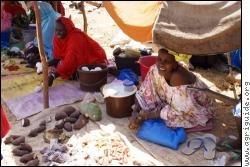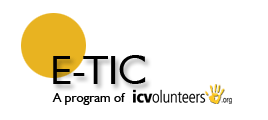ProgramE-TIC: un programme lié à l’agriculture et  The E-TIC program aims to empower local communities through the meaningful use of communication and the sharing of knowledge in a collaborative and hands on fashion. More specifically, the E-TIC tool box has been developed and applied to the needs of farmers, herders and fishermen in West Africa. It helps them get access to knowledge related to organic farming and ultimately better sell their products on local and international markets. In another context, the E-TIC tool box is also used to make viable the work of local designers involved in ethical fashion in Ghana, Mali and Burkina Faso. Theme: The issues of farming, rearing livestock, textile and their sanitary conditions are at the heart of this project ICVolunteers aims to provide the means to improve the information available to those directly involved in the agricultural sector, a pillar of the local economy for pastoral regions in Mali, Senegal and Ghana. Context: The isolated nature of rural zones means a large majority of farmers, herders and fishermen do not have access to information and communication technologies and information that would be very useful for their work and existence. Our activities: We accompany the development of practices, such as the exchange of information, whether on the market or in homes (prices, practices, phytosanitary information, etc.). We use various means of communication adapted to the specific context. Among these tools are mobile phones (SMS, voice), community radio, Internet and computers, video, audio messages, drawings and simple stories shared in interactive and participatory community meetings. Beneficiaries: Young farmers, journalists of community radios, women, information, communication specialists, designers and other actors involved in the textile sector. Partners: Local: Primature; Ministry of Agriculture; Ministry of Information and Communication Technologies (ICT); National Civil Service of Senegal; Radiodiffusion Télévision Sénégalaise (RTS); National Meteorological Office; various local authorities; Farmer organizations; Senegalese Institute of Agricultural Research (ISRA); CRESP; Youth and ICT_Mali. International: Fonds inforoutes -- Organisation Internationale de la Francophonie (OIF); SECO; FAO; UNESCO; Agence Universitaire de la Francophonie (AUF); French Embassies in Mali and Senegal; International Office of epizootic disease; Association Africaine de Suivi-Evaluation; CILSS; CIRAD (Agricultural Research for Developing Countries). Long term objectives:
To develop best practices and strategies for meaningful communication applied to the sectors of agriculture, herding, fishing and textile in Africa Role of ICV: To recruit cybervolunteers and coordinate the various activities of the project. Number of volunteers involved in the project: 350 To download this file: fiche_etic_wb_en.pdf (194.6K) |

